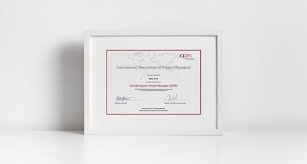
The Value of a Certified Project Manager in Today’s Business Landscape
The Importance of Hiring a Certified Project Manager
In today’s fast-paced business environment, the role of a project manager is crucial in ensuring the successful completion of projects on time and within budget. A certified project manager brings a wealth of knowledge, skills, and expertise to the table, making them an invaluable asset to any organisation.
One of the key benefits of hiring a certified project manager is their proficiency in project management methodologies and best practices. They are well-versed in various project management frameworks such as Agile, Scrum, and Waterfall, allowing them to adapt their approach based on the specific requirements of each project.
Furthermore, certified project managers possess strong leadership qualities that enable them to effectively lead and motivate their team members towards achieving project goals. They excel in communication, stakeholder management, risk assessment, and conflict resolution – essential skills for navigating the complexities of project execution.
By leveraging their expertise, certified project managers can streamline processes, mitigate risks, and ensure efficient resource allocation throughout the project lifecycle. Their ability to plan meticulously, monitor progress diligently, and make informed decisions sets them apart as professionals who can deliver results consistently.
Moreover, organisations that engage certified project managers benefit from enhanced credibility and reputation in the industry. Clients and stakeholders have confidence in the ability of a certified professional to drive projects to successful completion while adhering to industry standards and best practices.
In conclusion, investing in a certified project manager is a strategic decision that can significantly impact the success of your projects. Their expertise, leadership skills, and commitment to excellence make them indispensable assets in today’s competitive business landscape.
Essential Insights into Certified Project Management: Understanding the Role, Benefits, and Pathway to Certification
- What is a certified project manager?
- Why is it important to hire a certified project manager?
- How can I become a certified project manager?
- What are the key skills required for a certified project manager?
- How does certification benefit a project manager’s career?
What is a certified project manager?
A certified project manager is a professional who has undergone formal training and obtained certification in project management methodologies and best practices. These individuals possess the knowledge, skills, and expertise required to effectively plan, execute, monitor, and control projects to ensure successful outcomes. Certified project managers are well-versed in various project management frameworks such as Agile, Scrum, and Waterfall, allowing them to adapt their approach based on the specific requirements of each project. Their proficiency in leadership, communication, risk assessment, and stakeholder management sets them apart as valuable assets in driving projects to completion efficiently and effectively.
Why is it important to hire a certified project manager?
Hiring a certified project manager is essential for ensuring the successful execution of projects due to their specialised skills and knowledge in project management methodologies. Certified project managers bring a level of expertise that can streamline processes, mitigate risks, and ensure efficient resource allocation throughout the project lifecycle. Their proficiency in various project management frameworks, strong leadership qualities, and ability to communicate effectively with stakeholders make them invaluable assets in driving projects to successful completion. By engaging a certified project manager, organisations benefit from enhanced credibility, adherence to industry standards, and a higher likelihood of achieving project goals within budget and on schedule.
How can I become a certified project manager?
To become a certified project manager, individuals typically need to follow a structured process that involves acquiring the necessary education, gaining practical experience in project management, and obtaining a recognised certification. One common route is to pursue a bachelor’s degree in a related field such as business administration or engineering, followed by obtaining relevant work experience in project management roles. Many aspiring project managers also choose to pursue certification from reputable organisations such as the Project Management Institute (PMI) or the Association for Project Management (APM), which offer certifications like the Project Management Professional (PMP) or the PRINCE2 Practitioner. These certifications often require passing an exam and demonstrating a certain level of experience in managing projects effectively. By following these steps and continually developing their skills and knowledge in project management, individuals can work towards becoming certified project managers and advancing their careers in this dynamic field.
What are the key skills required for a certified project manager?
When considering the key skills required for a certified project manager, a blend of technical expertise and soft skills is essential for success in this role. Technical skills such as proficiency in project management methodologies, budgeting, scheduling, and risk management are paramount. Additionally, strong communication abilities, leadership qualities, problem-solving skills, adaptability to change, and the capacity to collaborate effectively with diverse stakeholders are equally crucial for a certified project manager to navigate the complexities of project execution and drive successful outcomes.
How does certification benefit a project manager’s career?
Achieving certification as a project manager offers numerous benefits that can significantly enhance one’s career prospects. Firstly, certification validates a project manager’s skills and expertise, demonstrating their commitment to professional development and excellence in the field. This recognition can open up new opportunities for career advancement, as certified project managers are often preferred by employers seeking individuals with proven proficiency in project management methodologies and best practices. Additionally, certification provides access to a network of like-minded professionals and resources, enabling continuous learning and growth within the industry. Overall, certification serves as a valuable asset that boosts credibility, increases job prospects, and reinforces the foundation for a successful career trajectory in project management.